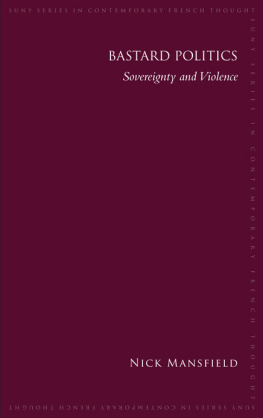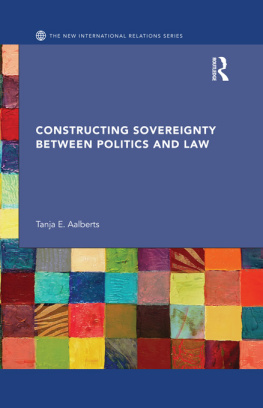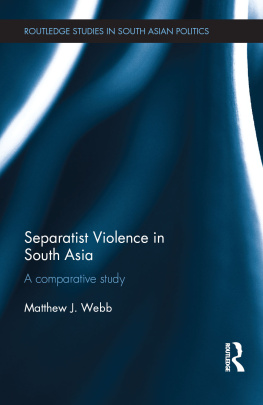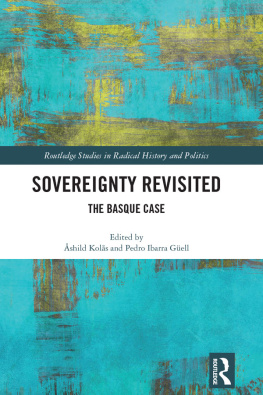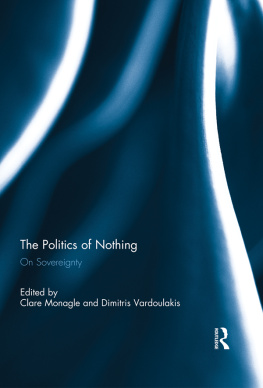Nick Mansfield - Bastard Politics: Sovereignty and Violence
Here you can read online Nick Mansfield - Bastard Politics: Sovereignty and Violence full text of the book (entire story) in english for free. Download pdf and epub, get meaning, cover and reviews about this ebook. year: 2021, publisher: State University of New York Press, genre: Religion. Description of the work, (preface) as well as reviews are available. Best literature library LitArk.com created for fans of good reading and offers a wide selection of genres:
Romance novel
Science fiction
Adventure
Detective
Science
History
Home and family
Prose
Art
Politics
Computer
Non-fiction
Religion
Business
Children
Humor
Choose a favorite category and find really read worthwhile books. Enjoy immersion in the world of imagination, feel the emotions of the characters or learn something new for yourself, make an fascinating discovery.
- Book:Bastard Politics: Sovereignty and Violence
- Author:
- Publisher:State University of New York Press
- Genre:
- Year:2021
- Rating:4 / 5
- Favourites:Add to favourites
- Your mark:
- 80
- 1
- 2
- 3
- 4
- 5
Bastard Politics: Sovereignty and Violence: summary, description and annotation
We offer to read an annotation, description, summary or preface (depends on what the author of the book "Bastard Politics: Sovereignty and Violence" wrote himself). If you haven't found the necessary information about the book — write in the comments, we will try to find it.
Bastard Politics: Sovereignty and Violence — read online for free the complete book (whole text) full work
Below is the text of the book, divided by pages. System saving the place of the last page read, allows you to conveniently read the book "Bastard Politics: Sovereignty and Violence" online for free, without having to search again every time where you left off. Put a bookmark, and you can go to the page where you finished reading at any time.
Font size:
Interval:
Bookmark:

SUNY series in Contemporary French Thought
David Pettigrew and Franois Raffoul, editors
For Nicole Anderson and Elaine Kelly
BASTARD POLITICS
Sovereignty and Violence
N ICK M ANSFIELD

Published by State University of New York Press, Albany
2021 State University of New York
All rights reserved
Printed in the United States of America
No part of this book may be used or reproduced in any manner whatsoever without written permission. No part of this book may be stored in a retrieval system or transmitted in any form or by any means including electronic, electrostatic, magnetic tape, mechanical, photocopying, recording, or otherwise without the prior permission in writing of the publisher.
For information, contact State University of New York Press, Albany, NY
www.sunypress.edu
Library of Congress Cataloging-in-Publication Data
Name: Mansfield, Nick, author.
Title: Bastard politics : sovereignty and violence / Nick Mansfield.
Description: Albany : State University of New York Press, [2021] | Series: SUNY series in contemporary French thought | Includes bibliographical references and index.
Identifiers: LCCN 2020016066 | ISBN 9781438481654 (hardcover : alk. paper) | ISBN 9781438481661 (ebook)
Subjects: LCSH: Derrida, Jacques. | Sovereignty. | DemocracyPhilosophy. | Political violence. | Philosophy, French20th century.
Classification: LCC JC327 .M29 2021 | DDC 320.1501dc23
LC record available at https://lccn.loc.gov/2020016066
10 9 8 7 6 5 4 3 2 1
CONTENTS
ACKNOWLEDGMENTS
Part of originally appeared in Derrida Today (11, no. 1 [2018]: 4959).
A big thank you to my generous bosses Jim Piper and Sakkie Pretorius for their indulgence and encouragement (even if I didnt always explain very clearly what it was all about). To my family also, especially my partner Bonny, for their patience and irrepressible excitement!
This book is dedicated to Nicole Anderson and Elaine Kelly. The continental philosophy world, especially the world of Derrida studies, owes a huge debt to Nicole for her commitment, dedication, and unstinting insistence on rigor and quality. I owe a great debt to her personally for her support and friendship over too many years to number. Elaine has read and reread drafts of this manuscript and offered unflinching support, encouragement, and insightful advice at all stages. But above all, I want to acknowledge Elaines warmth, humor, and deep humanity, both in her work and her friendship. She is an inspiration to all of us.
INTRODUCTION
Sovereignty is NOTHING.
Georges Bataille, The Accursed Share:
An Essay on General Economy , 1993
W e are seeing a rebirth of rebellion. In recent years, the debate has been dominated by two grand narratives: one ideologicalthe neoliberal consensusthe other, a warning about where we are heading: climate change apocalypse. Both of these narratives are marked by a deep ambiguity: they are simultaneously narratives of activity and passivity, of human destiny and frustration of the will. For neoliberalism, on the one hand, we have no choice but to allow the market to be the judge of all things, because it is only in the market that we are able to prove ourselves most resolutely. In the face of rampant climate change, on the other hand, we await unknowns that will threaten our very existence, while at the same time, we expect ourselves to follow the science and make overarching collective plans about how the planet should be managed sustainably. Thus, climate change is something that will happen to us, yet we see ourselves as both thinking and managing the global climate future in its totality. What characterizes our sense of where we are in these two narratives is both a sense of commandwe must actand of vulnerabilitythings happen to us, whether we like it or not.
The aim of this book is to try to reconfigure this double logic by renewing the discourse of sovereignty. It argues, firstly, that the two discourses previously mentioned are inadequate as ways of grasping the future intentionally. The neoliberal faux-consensus rests on the idea that human life is theoretically unconditioned, opening potentially infinitely without either environmental constraint or determining historical legacy; the second assumes human life should go on while remaining almost totally agnostic about why that should be. These views are not wrong in any simple way, but they disguise another deeper question: Why is it that our life seeks to continue itself and our philosophies, both casual and systematic, consent? Is it just a further instance of the liberal orthodoxy that people should be allowed to live on freely according to any logic or meaning they choose if thats what they want to do? Such an assumption makes our philosophy unphilosophical. It answers the great ethical questions without recourse to any ethic. Or is it that there are not too few, but rather too many reasons to live, and there will never be consensus about what they mean, let alone which to prefer?
I do not intend to identify a version of what the will to life is or should be, but I do believe it is here that we need to start if we are to talk about the way forward. There is an assumption of human living-on that is either supposedly expressed in the grand narrative of neoliberal consensus or set aside as the incontestable question that the grand narrative of climate change apocalypse cannot or does not need to address. Whichever we choose, both of these grand narratives have lying behind them something larger and more insistent that they either take for granted or are incapable of addressing. I argue that this taken-for-granted thing is best considered using the language of sovereignty, for two reasons. Firstly, sovereignty provides a language for the human insistence on itself. Secondly, it is our ambivalence toward sovereignty, our complex double-drive to both fetishize and anathematize it, to celebrate and distrust it, to invest in it and fear it, to see it as both the guarantee of autonomy and freedom, and the greatest driver of straitening, homogenization, and oppression, that explains the doubleness I identified previously in our supposed grand narratives, their simultaneous recourse to drive and will, on the one hand, and vulnerability and passivity, on the other.
As we will see, there is an irreducible relationship between sovereignty and violence, and this is where sovereignty is at its most problematic. This is enough for some to see sovereignty as irredeemably contaminated, as irrecuperable for any positive political agenda. To others, violence is the tool that sovereignty is required to use in order to stabilize social order and defend its right. I will argue that neither of these positions is valid: on the one hand, sovereignty should not simply be excoriated because it is always open on violence. To abdicate sovereignty for this reason is, I will argue, to abandon the political altogether and, thus, to give up on lifes As we will see, this is not a sentimental or simply benign commitment. In his last lectures, his discussion of the Heideggerian theme of Walten characterizes life as always already invested with the danger, promise, and violence of the sovereign. The deconstructive account of sovereignty stands, therefore, as the culmination of the Western discourse of sovereignty, looking back at its uneasy history but also considering its continuing and irrepressible claims. In my account, politics is sovereignty in action. Politics is not simply a way to get things done, to administer systems and plot incremental improvements in the quality of life. The deconstructive logic of life as always already animating the sovereign reveals sovereignty in its immanence in all human things, in its rampant generality. It shows how sovereignty is the language, above all, of human insistence.
Font size:
Interval:
Bookmark:
Similar books «Bastard Politics: Sovereignty and Violence»
Look at similar books to Bastard Politics: Sovereignty and Violence. We have selected literature similar in name and meaning in the hope of providing readers with more options to find new, interesting, not yet read works.
Discussion, reviews of the book Bastard Politics: Sovereignty and Violence and just readers' own opinions. Leave your comments, write what you think about the work, its meaning or the main characters. Specify what exactly you liked and what you didn't like, and why you think so.

